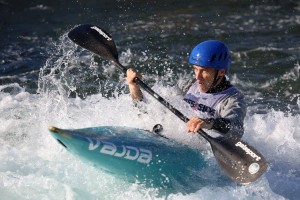 The 2014 slalom season is over. I had two goals, first of all to gain promotion to Premier Division (done) and second to race well and achieve my best result at the British Open. So how did I get on? If I look at the results of the British Open I should be content; after all I finished ahead of Olympic champions Daniele Molmenti and Sebastien Schubert in the B final. So how come I don’t feel satisfied that I did my best? Well, this is a great example of the difference between judging performance by the results and the process. Although it makes a nice sound bite to say I finished ahead of a gold medalist, the reality is that both these paddlers finished low because of a 50 second penalty that marred runs fast enough for a top 3 finish. I finished 51st, which was my highest placing of the weekend, ironically with the performance I was most dissatisfied with because I hit four gates and rolled. Of my four race runs over the weekend, the one that I was most pleased with on my own terms gave me by worst finishing place (71st overall in Saturday’s Premier race). I had been hoping to put in a run within 117% of the winner, but this proved too optimistic in a strong field on the Olympic course.
The 2014 slalom season is over. I had two goals, first of all to gain promotion to Premier Division (done) and second to race well and achieve my best result at the British Open. So how did I get on? If I look at the results of the British Open I should be content; after all I finished ahead of Olympic champions Daniele Molmenti and Sebastien Schubert in the B final. So how come I don’t feel satisfied that I did my best? Well, this is a great example of the difference between judging performance by the results and the process. Although it makes a nice sound bite to say I finished ahead of a gold medalist, the reality is that both these paddlers finished low because of a 50 second penalty that marred runs fast enough for a top 3 finish. I finished 51st, which was my highest placing of the weekend, ironically with the performance I was most dissatisfied with because I hit four gates and rolled. Of my four race runs over the weekend, the one that I was most pleased with on my own terms gave me by worst finishing place (71st overall in Saturday’s Premier race). I had been hoping to put in a run within 117% of the winner, but this proved too optimistic in a strong field on the Olympic course.
This all reminds me of one of the central tenets of Mastery Motivation – it’s about striving to be the best you can be, and this is not judged by how well OTHER people perform!
Despite not achieving the performance I wanted, I really enjoyed the weekend of racing and the presence of so many international paddlers from Germany, Holland, Sweden, Spain, Slovakia (and more). Lee Valley will host next year’s slalom world championships, which also serves as selection for the Rio 2016 Olympics, so many paddlers based a training camp around the British Open. British K1 paddler Joe Clarke showed that he’s got the pace to mix it with the world’s best, while Ryan Westley lived up to his promise by taking the C1 title. I was also pleased to see the new C2 crew of Mark Proctor and Etienne Stott perform strongly. Full results are here.
I’m now into winter training, and one of the perks of my job as the Canoe Wales sport psychologist is access to their winter training programme. So for the first time in more than 25 years I’m following a proper periodised training schedule that defines different objectives and intensity of training in a series of 4 week blocks. I can’t fit in the same volume of training as the youngsters as I still need to earn a living, but I’m appreciating the structure and variety. Technically I’ve got clear objectives for the winter too. I’ve been getting some coaching from Huw Swetnam, who has helped me identify how I can make up quite a bit of time by changing my approach to upstream gates. I tend to be a bit ‘old school’ in my approach, which is simply too conservative for today’s shorter courses. Instead I need to narrow the margins between my body and the poles and keep higher in the gateline.
This weekend I plan to get over to Hurley weir for my first freestyle session of the season. And on 23 November I’ll be at the 25th Hurley Classic, giving a talk on performance psychology based on my book In the Flow. The Classic is always worth a visit, with a range of events from boater cross to serious, and not so serious, freestyle. Then if the rain continues I’ll be off to Devon in December for some river running. It’s always nice to get onto proper natural rivers after so much time on artificial slalom courses.
And who knows what 2015 will bring? Watch this space…
The photo is by Peter Milsom www.petermilsomphotography.co.uk


